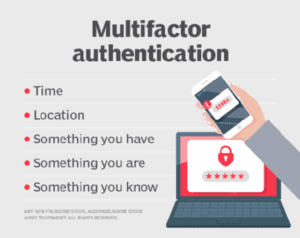Multi-Factor Authentication (MFA): Keeping Your Data Secure
 Data security is an important topic for businesses of all sizes and individuals these days. Multi-Factor Authentication (MFA) is one of the most effective methods to secure data.
Data security is an important topic for businesses of all sizes and individuals these days. Multi-Factor Authentication (MFA) is one of the most effective methods to secure data.
We will take a dive into what multi-factor authentication is, why it should be used and the challenges associated with implementing this technology.
We will also explore the benefits MFA offers in terms of data security so you can make an informed decision when deciding how to protect your company or personal data, such as our Multi-Factor Authentication (MFA) solutions with Monday.com Project Management.
Introduction to Multi-Factor Authentication (MFA)
Data security is becoming increasingly important in today’s digital landscape. With the rise of cybercrime, organizations and individuals alike are feeling the need to take greater measures to protect their data and information. One way to do this is through the use of multi-factor authentication.
We’ll look at what multi-factor authentication is, why it’s so beneficial for keeping your data secure, and how you can implement it in your own organization or personal accounts. So read on as we explore the benefits of using multi-factor authentication for ensuring data security!
What Is Multi-Factor Authentication?
Multi-Factor Authentication (MFA) is a security feature that provides an extra layer of protection for online accounts. It requires two or more pieces of evidence to verify a user’s identity and grant access. Typically, this evidence includes something you know (like a password), something you have (such as a physical token or mobile device), and/or something you are (like biometric data).
MFA helps to reduce the risk of unauthorized access by reinforcing conventional passwords with additional factors, making it harder for criminals to gain access to sensitive information.
Benefits Of Using MFA
Multi-Factor Authentication (MFA) is an important tool to help protect your data from cyber attacks and security threats. With MFA, extra layers of authentication are added when signing in to a website or application, providing an additional barrier that makes it harder for hackers to gain access to your account.
This helps ensure that only you can access the sensitive information within your account. By using MFA, you can enjoy peace of mind knowing that your data is protected and secure. Additionally, using MFA can save you time; since there is no need to reset passwords constantly due to unauthorized access attempts, you can quickly log into accounts without unnecessary delays.
Challenges Of Implementing MFA
Implementing multi-factor authentication can present certain challenges. It is important to ensure that the system is set up correctly and that users are made aware of how to interact with it properly. This includes educating them on the different types of authentication available, such as email or text messages, biometric scanning, or hardware key fobs.
If a user doesn’t understand how to use the system, they may become frustrated and less willing to use it in the future. Implementing multi-factor authentication requires an investment in additional hardware and software resources, which can be difficult for some businesses to afford.
Nevertheless, when done correctly these efforts provide an added layer of security which is incredibly valuable in today’s data environment.
For more useful information from The WOW Adventure, please feel free to join our mailing list:
Conclusion
Multi-Factor Authentication is a powerful tool for protecting your data. With its use of layered authentication processes and its ability to detect suspicious activity, it provides an extra layer of security that can help keep your data secure.
By using Multi-Factor Authentication, you can ensure that only authorized people have access to your data. And prevent unauthorized access from malicious actors.
It’s important to remember that no matter how secure a system may be, it’s only as strong as the weakest link in the chain. Therefore, it pays to take proactive steps such as using MFA to keep your data safe and secure – contact us about your data security, stored locally or in the cloud.



